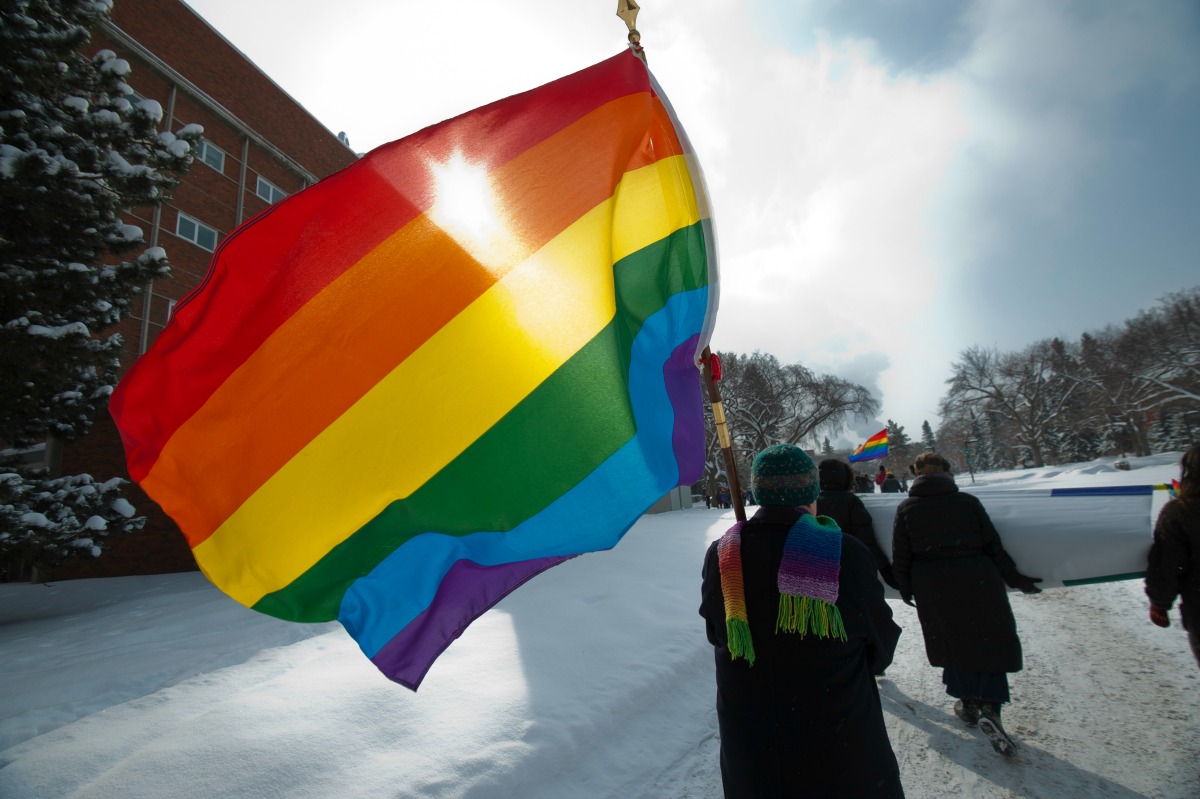Pride Week 2018 celebrates past, present and future equality
Scott Lingley - 9 March 2018

A temporary all-gender change room set up in the University of Alberta’s fitness and recreation facilities for Pride Week 2018 is emblematic of the strides the Pride movement has made and the work that still needs to be done to create welcoming and inclusive spaces for all on campus, according to a Pride Week organizer.
“Pride should be an opportunity for looking around at barriers to access that are still in place and figuring out how to break them down,” said Rebecca Blakey, sexual and gender minority equity advisor at the Institute for Sexual and Gender Minority Studies and Services (iSMSS) based in the Faculty of Education.
Blakey said that while official Pride events on campus are only a few years old, there have always been LGBTQ2S+ people in the university community advocating for dismantling barriers to thriving. But, while progress has been made, the important work of Pride is far from over, especially with regards to those who experience multiple forms of marginalization.
“The origins of Pride Week generally are in political struggle for the rights, safety and acceptance of LGBTQ2S+ people,” Blakey said. “All LGBTQ2S+ people experience discrimination as a result of gender and or sexuality, but people also experience racism, classism, ableism, and discrimination based on citizenship and age and religion and place of origin.”
A change (room) for the better
The all-gender change room, located in the Van Vliet Centre’s Team Room 7 for the duration of this year’s Pride Week (March 12-21), is an example of using Pride as an occasion to think about transforming campus spaces to ensure they’re accessible to everyone in the community.
“People who can’t use binary-segregated facilities are effectively banned from practicing that self-care of participating sports and recreation activities,” Blakey said. “When we design spaces, it’s important that we pay a lot of attention to accessibility issues generally from gender to accessible showers to space for changing children to make spaces family-friendly. It really lays the path for future discussions, when the facility is renovated, about implementing universal design practices in every way possible.”
Pride Week features a number of other events as well, including Aboriginal Student Services’ Rainbow Stew and Bannock lunch, which immediately precedes the Pride Parade on March 14, as well as presentations covering topics from LGBTQ2S+ representation in the sciences to ending homophobia and transphobia, the latter of which is presented by Blakey.
“It’s important we understand the origins of homophobia and transphobia as being in located in colonialism, which means we can see their connection to other forms of oppression and discrimination,” Blakey says. “We’ll talk about how can we recognize homophobia and transphobia playing out not only in our individual environments but in every single level of society and, once we understand that, how we can intervene to stop them.”
Celebrating Vriend at 20
This year’s Pride events also coincide with the 20th anniversary of the Supreme Court of Canada’s decision in the case of Vriend vs. Alberta, which led to the inclusion of sexual orientation as a prohibited ground of discrimination under the Alberta Individual’s Rights Protection Act. A number of U of A law alumni and faculty were involved in the case and a panel discussion on March 19 in the Telus Centre will revisit the landmark ruling which paved the way for further important advancements in human rights, including same-sex marriage. Panelists include chancellor Doug Stollery and Alberta Court of Appeals justice Sheila Greckol, who represented complainant Delwin Vriend, as well as Board of Governors chair Michael Phair and iSMSS faculty director Kristopher Wells.
“It’s such a landmark case that brought the community together to fight back against oppression and really started a movement of being able to stand up and speak up against discrimination,” Wells said. “Vriend has been ranked as one of the 10 most important equality decisions in the history of the Supreme Court of Canada. What we’re hoping to highlight at this inaugural Chancellor’s Forum is the role people connected to the University of Alberta played in the Vriend decision.”
Blakey said she’s pleased by how well Pride Week events are supported by the campus community but, as Pride is intended to remind us, there’s always room to do better.
“If we are a campus the purports to care about the health and well-being of the people in our community, we have to take seriously our role in creating an environment where people have the freedom to self-determine,” Blakey said. “Being a member of the campus community means paying attention to the ways people are barred from thriving and doing our best to change those circumstances.”
U of A Pride Week, sponsored by Shell Canada, takes place March 12 - 21 at various locations around campus. View the full list of events at iSMSS’s Pride Week webpage.